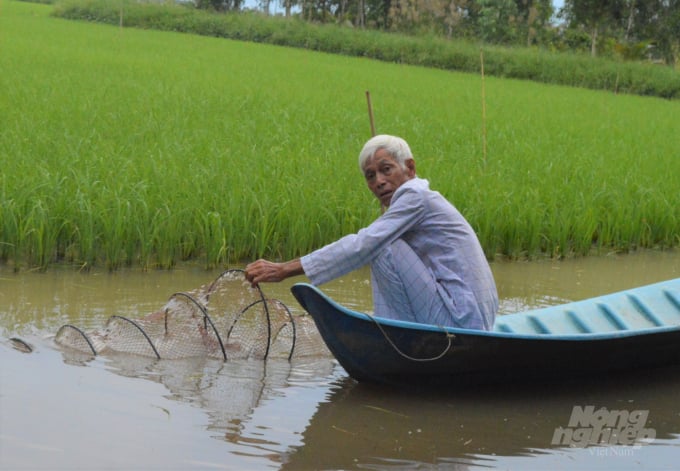May 20, 2025 | 15:32 GMT +7
May 20, 2025 | 15:32 GMT +7
Hotline: 0913.378.918
May 20, 2025 | 15:32 GMT +7
Hotline: 0913.378.918
According to Kien Giang Province’s Department of Agriculture and Rural Development, when restructuring its agricultural sector and implementing the Government’s Resolution 120, the province has strongly shifted to develop fisheries economy, which generated high efficiency. Focusing on reorganizing production following value chains, improving efficiency, in the 2016-2020 period, the production value of the province’s fishery industry grew by an average of more than 6 per cent per year.

Tens of thousands of hectares of rice land that is inefficient or cannot access water supply has been converted into shrimp growing areas or shrimp-rice combined model. Photo: Trung Chanh.
Specifically, tens of thousands of hectares of rice production land that is inefficient or cannot access water supply has been converted into shrimp growing areas or shrimp-rice combined model, bringing high efficiency. In 2015, the province's shrimp-rice production area was nearly 78,000 hectares, with the shrimp output being more than 31,000 tons. Until 2020, the shrimp-rice production area increased to 100,000 ha and the shrimp output of 47,000 tons. The conversion of the inefficient rice production area to the shrimp-rice model has brought high economic efficiency to producers. Their average income increased from VND50 million/ha to VND100 - 130 million/ha.
The province developed industrial and semi-industrial shrimp farming with an increase of more than 50 per cent in the area and nearly 87 per cent in output by 2020 compared to those of 2015. Specifically, increasing the farming area from 2,132ha with an output of nearly 15,000 tons to 3,200ha with an output of 28,000 tons.
Caged-fish farming at sea also saw a sharp increase from 2,613 cages and an output of 1,900 tons in 2015 to 4,500 cages and an output of 3,555 tons in 2020.
The fishery economy is gradually becoming a key economic sector in Kien Giang’s agriculture sector.
In the fishery sector, small-capacity vessels and coastal fishing are replaced with large-capacity vessels and offshore fishing, which help further protect marine resources and national maritime sovereignty and security.
Translated by Hien Anh

(VAN) Dong Thap farmers attained an average profit margin of 64% during the summer-autumn 2024 crop (first season), while An Giang and Kien Giang farmers followed with 56% and 54%, respectively.

(VAN) As a doctoral student doing research on renewable energy and electrification at Harvard University, the author shares his musings on electricity, nature, and countryside memories.

(VAN) The decree on Extended Producer Responsibility (EPR) ensures transparent management and disbursement of support funds, avoiding the creation of a “give-and-take” mechanism.

(VAN) Hue City rigorously enforces regulations regarding marine fishing and resource exploitation, with a particular emphasis on the monitoring of fishing vessels to prevent illegal, unreported, and unregulated (IUU) fishing.

(VAN) Hanoi People's Committee has issued a plan on reducing greenhouse gas emissions in the waste management sector with 2030 vision.

(VAN) Vietnam's draft amendment to Decree No. 156 proposes a mechanism for medicinal herb farming under forest canopies, linking economic development to population retention and the sustainable protection and development of forests.

(VAN) In reality, many craft village models combined with tourism in Son La have proven effective, bringing significant economic benefits to rural communities.